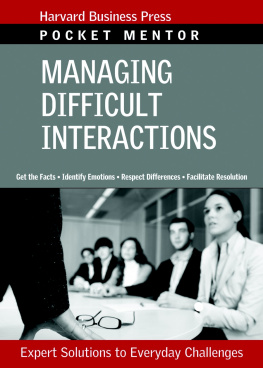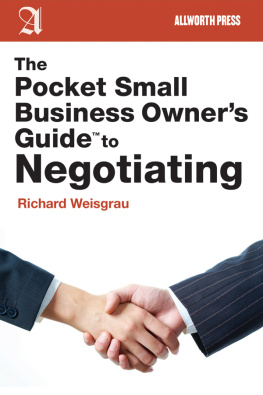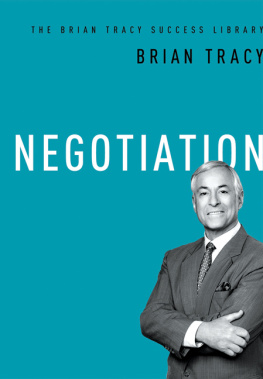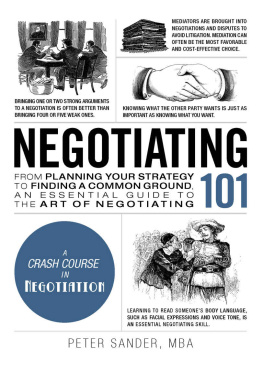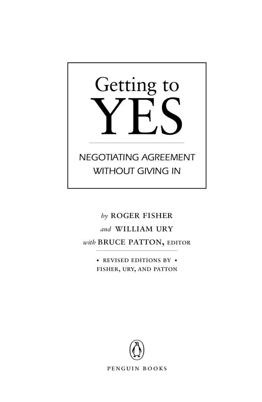Arm yourself with the advice you need to succeed on the job, from the most trusted brand in business. Packed with how-to essentials from leading experts, the HBR Guides provide smart answers to your most pressing work challenges.
HBR Guide to
Negotiating
Jeff Weiss
HARVARD BUSINESS REVIEW PRESS
Boston, Massachusetts
HBR Press Quantity Sales Discounts
Harvard Business Review Press titles are available at significant quantity discounts when purchased in bulk for client gifts, sales promotions, and premiums. Special editions, including books with corporate logos, customized covers, and letters from the company or CEO printed in the front matter, as well as excerpts of existing books, can also be created in large quantities for special needs.
For details and discount information for both print and ebook formats, contact .
Copyright 2016 Harvard Business School Publishing Corporation
All rights reserved
No part of this publication may be reproduced, stored in or introduced into a retrieval system, or transmitted, in any form, or by any means (electronic, mechanical, photocopying, recording, or otherwise), without the prior permission of the publisher. Requests for permission should be directed to , or mailed to Permissions, Harvard Business School Publishing, 60 Harvard Way, Boston, Massachusetts 02163.
The web addresses referenced in this book were live and correct at the time of the books publication but may be subject to change.
Cataloging-in-Publication data is forthcoming.
ISBN: 9781633690769
eISBN: 9781633690776
The paper used in this publication meets the requirements of the American National Standard for Permanence of Paper for Publications and Documents in Libraries and Archives Z39.48-1992.
What Youll Learn
For many people, negotiating may be scary or unpleasant. You worry that you may not have the right skills to go head-to-head with someone and get what you deserve, or that youll damage your relationship with your boss, customer, or colleague in the process. You fear that the negotiation will escalate into hard bargaining or a heated debate and that, in the end, one of you is going to have to give up something you want just to reach an agreement.
But negotiations dont need to be stressful. You can work with your counterpart to get what both of you want in a more productive, positive way. In this guide, youll learn a collaborative and creative approach that results in better outcomes and stronger relationships. It works in any situation in which you and a counterpart need to come to terms despite competing interestsfrom formal multimillion-dollar sales agreements to informal conversations with colleagues about how you will tackle a quick project.
Youll get better at:
- Identifying the real issues at stake
- Overcoming your assumptions about the other party
- Preparing materials in advance
- Setting the right tone as you begin the conversation
- Coming up with potential solutions that work for both parties
- Narrowing down your options
- Handling emotions in the negotiating room
- Recovering when communications break down
- Taming the hard bargainer
- Knowing when to walk awayand how to strengthen your fallback plan beforehand
- Managing multiple-party negotiations
- Reality-proofing your agreement
- Learning from your negotiation
Contents
Negotiation is about creativity, not compromise.
Carefully define your measure of success.
The best negotiator is the most prepared one
Develop new, more empowering expectations.
Understand interests, brainstorm options, research standards, and consider alternatives.
Plan how you will work and communicate with the other party.
Agree on the process and whos involved.
Power comes from negotiating with discipline
Establish how youll work together.
Make the most of your time together.
Narrow in on a workable solution and commit with care.
Be prepared to change course.
Tools and techniques you can use in specific situations
Avoid inefficiency and chaos.
Shift the conversation.
Build understanding.
Go from boiling to cool.
Careful review drives learning and improvement
Know when youre done, and communicate the final decisions.
Use lessons learned today for improvement tomorrow.
Introduction
Negotiation is about creativity, not compromise.
Whether youre aware of it or not, youre negotiating all the time. When you ask your boss for more resources, agree with a vendor on a price, deliver a performance evaluation, convince a business partner to join forces with your company, or even decide with your spouse where to go on your next vacation, youre taking a potentially conflict-filled conversation and working toward a joint solution. Thats what a negotiation isa situation in which two parties with potentially competing incentives and goals come together to create a solution that satisfies everyone.
Its not just high-stakes, months-long discussions that warrant a thoughtful approach. Improving your ability to handle all of these situations pays off. This means honing skills such as conflict management (as youd expect) and creative thinking (which you might not), both of which are critical to reaching mutually beneficial decisions.
Ive heard many people say that being a good negotiator is about thinking quickly on your feet or being a better orator or debater than your counterpart. Sure, those things are helpful. But the best negotiatorsthe ones who most often get what they wantare those who are the most prepared and the most creative.
This guide will help you develop the skills to negotiate like them so that youll be more effective at workand even get that trip to Maui on the calendar.
The advice in this guide is meant for professionals at all levels. You may have years of experience under your belt or be relatively new to negotiation. It is also applicable to negotiations of any size, whether youre the lone person at the table or have a team supporting you. Throughout the guide, Ill give examples of negotiations large and small to show you how the tactics I recommend play out.
Rethink Your Approach to Negotiations



